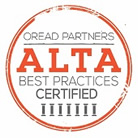It all starts with a dynamic group of individuals who are actively redefining the phrase “above and beyond” – Simone Anu (Processor), Keith Murphy (Loan Officer), and Rebecca ‘Becky’ Muse (Notary). We have had the pleasure of working with Simone and Keith for quite some time, and in that time we have had the opportunity to share in many successful transactions with these seasoned professionals. In fact, it was Simone and Keith who referred Becky for a closing scheduled earlier this month. As we all know, closings don’t always go as planned; no matter how much preparation goes into a transaction. Often, the most successful transactions are dripping with unexpected changes and new developments that unfold rather quickly. The test is how you navigate and adapt to these changes.
In the reverse mortgage industry you hear stories of people putting the borrower first, this story is definitely one to remember. Unfortunately, at a point in the transaction the borrower was admitted to the hospital; without hesitation Becky and Keith dawned hospital gowns and gloves to proceed with the signing at the borrower’s request. After two and a half hours in an 85 degree hospital room, Keith and Becky completed the signing; with minutes to spare, they also managed to get the documents overnighted. Through a coordinated effort they were able to maintain a level of care and professionalism that helped the borrower feel secure.
Once the borrower was released from the hospital, Becky returned for one final signature. Becky took it upon herself to further assist the borrower and run some quick errands. On her way to the borrower’s home she stopped to pick up the their prescriptions and grabbed some groceries as well. Upon her arrival the borrower was unable to locate their checkbook to reimburse her for the kind gesture, but Becky didn’t mind. She proceeded to tell the borrower that this was her treat! “Our team is very proud of Becky, she is truly an asset….with a very big heart, compassion and patience,” said Melissa Moran from SoCal Signing Agents.
Moments like these bring warmth to the industry and remind us of why we do what we do. Thank you Becky for being a shining example of excellence, your genuine sense of spirit and selflessness are admirable. Thank you Simone and Keith for working to illuminate the reverse mortgage industry with your positivity and for sharing such an incredible story.




